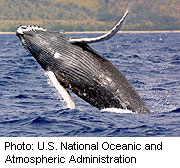
SATURDAY, April 11, 2015 (HealthDay News) — Marine animals are getting bigger, a new study shows.
Over the past 542 million years, the average size of sea creatures has increased by 150 times, the Stanford University researchers report.
“That’s the size difference between a sea urchin that is about 2 inches long versus one that is nearly a foot long,” Noel Heim, a postdoctoral researcher at Stanford’s School of Earth, Energy & Environmental Sciences, said in a university news release. “This may not seem like a lot, but it represents a big jump.”
Using computer simulations, photographs and detailed illustrations of fossils, the team was able to calculate and analyze body size and volume for more than 17,000 sea animals dating back millions of years. The researchers determined the pattern of increasing body size among sea creatures was driven by natural selection — not by chance.
The increase in body size that has occurred is not due to all animals steadily getting bigger, the researchers explained. Essentially, every marine animal hasn’t grown in size, but over millions of years the ocean filled up with a greater variety of larger animals.
“That’s also something we didn’t know before,” study co-author Jonathan Payne, a paleobiologist at Stanford’s School of Earth, Energy & Environmental Sciences, said in the news release. “For reasons that we don’t completely understand, the classes with large body size appear to be the ones that over time have become differentially more diverse.”
Heim added that, “It’s really a story of the survival and diversification of big things relative to small things.”
The study was published recently in the journal Science.
The team said their findings could support future investigations into evolutionary trends involving other traits.
“The discovery that body size often does evolve in a directional way makes it at least worth asking whether we’re going to find directionality in other traits if we measure them carefully and systematically,” Payne said.
More information
The University of California, Berkeley, has more on evolutionary trends.
Copyright © 2026 HealthDay. All rights reserved.

